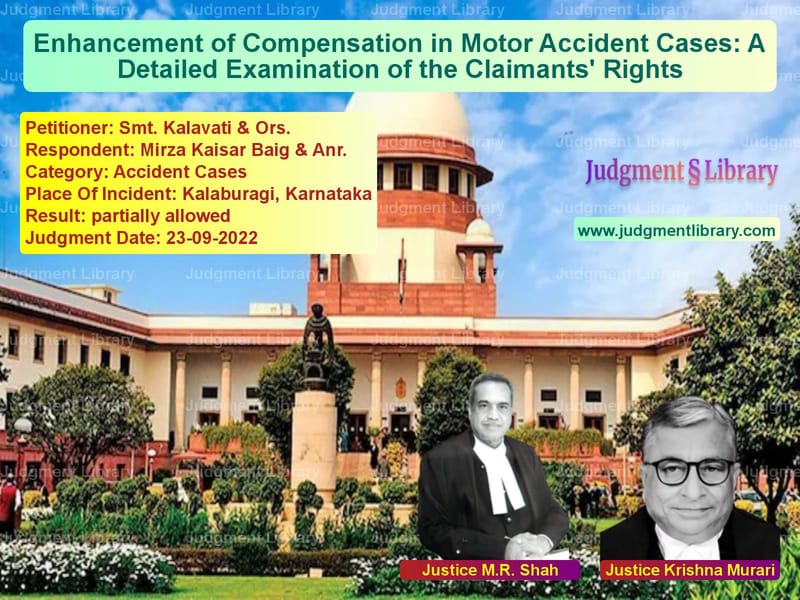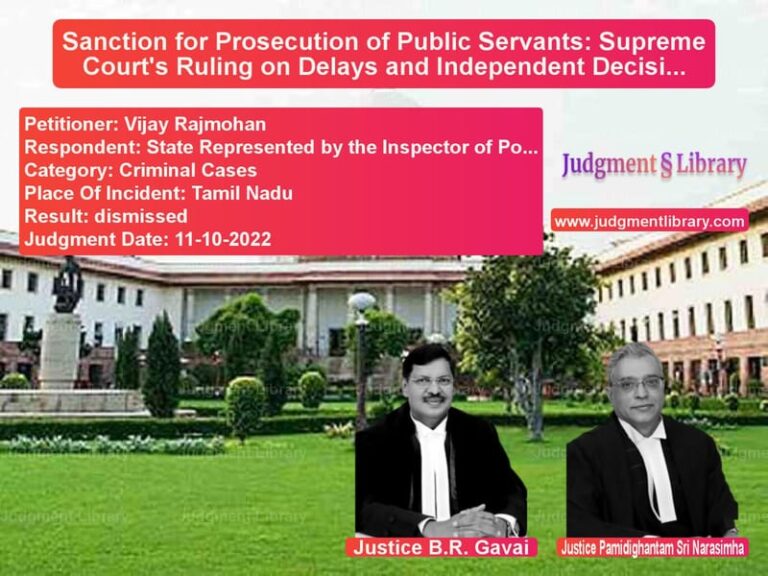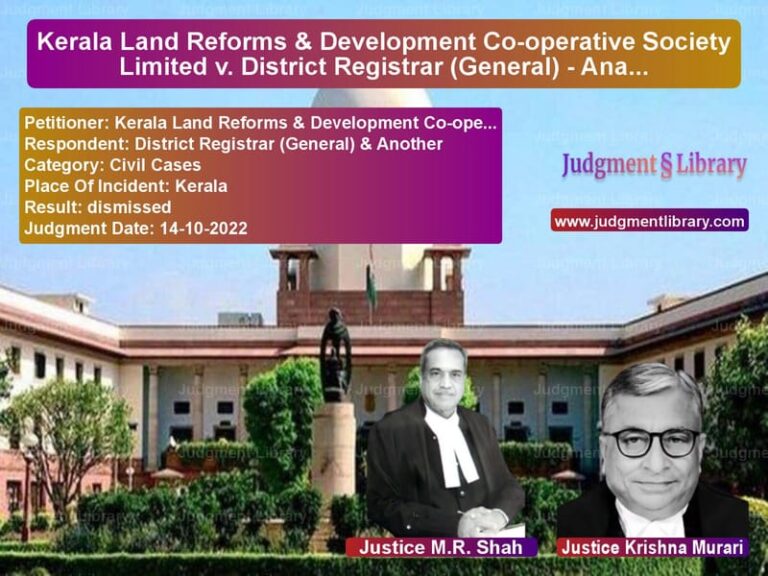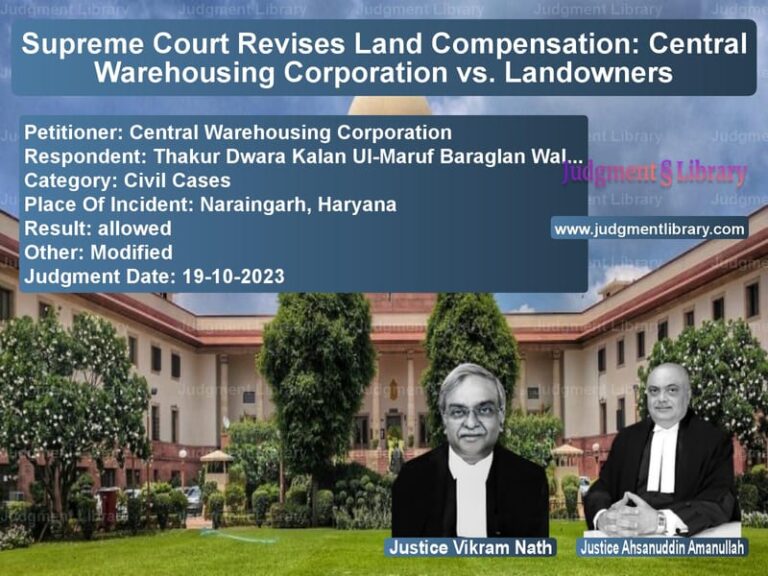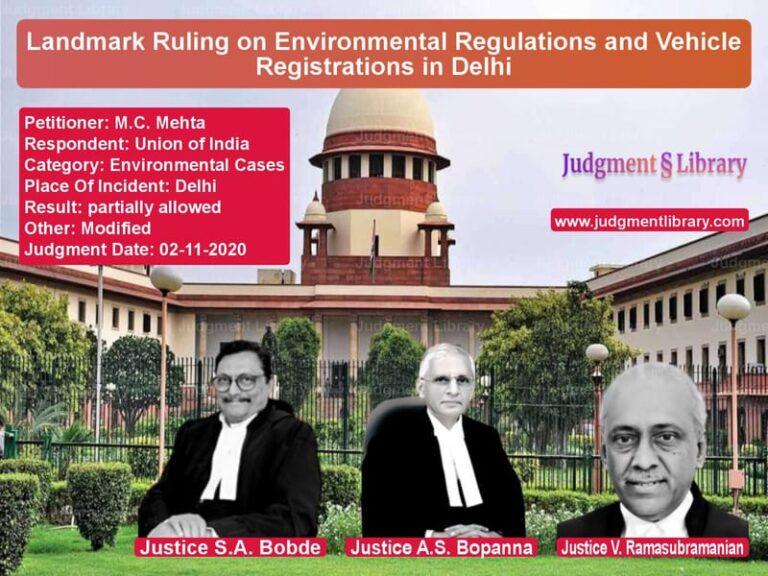Enhancement of Compensation in Motor Accident Cases: A Detailed Examination of the Claimants’ Rights
The case of Smt. Kalavati & Ors. v. Mirza Kaisar Baig & Anr. involves the appeal of two sets of claimants who were dissatisfied with the compensation awarded to them by the High Court following a fatal road accident. The claimants, who had lost their loved ones, contended that the compensation for the loss of dependency was inadequate, and they sought its enhancement. The key issue in the case was the amount of compensation due to the deceased’s family, considering the income and the extent of dependency.
The case originated from a tragic road accident where the deceased were employed as drivers and were holding valid driving licenses at the time of their death. The initial compensation awarded by the Tribunal was Rs. 10,70,000 for one set of claimants and Rs. 9,00,000 for another. However, both sets of claimants appealed for higher compensation, arguing that the Tribunal had underestimated the monthly income of the deceased, which led to an inadequate amount for their family’s sustenance.
The petitioners argued for an enhancement of the monthly income of the deceased from Rs. 7,500 to Rs. 15,000, with corresponding adjustments to the compensation under different heads. The Supreme Court had to examine the fairness of the compensation awarded and decide whether the claims for higher compensation were justified. The case also involved reviewing how the concept of future prospects and dependency should be accounted for in such tragic cases.
Read also: https://judgmentlibrary.com/enhancement-of-compensation-in-fatal-road-accident-case/
Background of the Case
The claimants, in both appeals, sought compensation for the death of their loved ones, who were employed as drivers at the time of the accident. The deceased persons were earning Rs. 7,500 per month, and the Tribunal had awarded compensation based on this income, leading to the total compensation amounts of Rs. 10,70,000 and Rs. 9,00,000 respectively. The High Court, in its judgment, enhanced the compensation to Rs. 15,98,120 and Rs. 12,25,104 by considering the income of the deceased at Rs. 8,500 per month.
The claimants, aggrieved by the High Court’s judgment, filed an appeal before the Supreme Court seeking further enhancement of the compensation, arguing that the income of the deceased should be considered as Rs. 15,000 per month instead of Rs. 7,500 or Rs. 8,500. They claimed that the compensation awarded did not fully reflect the loss of dependency and the family’s loss of support.
Petitioner’s Arguments
The petitioners presented the following arguments in their appeal:
- Underestimated Income: The petitioners argued that the income of the deceased was grossly underestimated by both the Tribunal and the High Court. They claimed that the deceased drivers were earning at least Rs. 15,000 per month, which should be the basis for calculating the compensation.
- Dependency of the Family: The petitioners contended that the compensation awarded under the head of loss of dependency was insufficient and did not adequately reflect the support provided by the deceased to their families. They argued that considering the higher income of Rs. 15,000 per month, the compensation should be substantially higher.
- Inadequate Consideration of Future Prospects: The petitioners argued that the courts below had failed to consider the future prospects of the deceased. They contended that a proper increase in income should have been accounted for, considering the fact that both deceased individuals had significant career potential and had rising incomes before the tragic accident.
- Legal Precedents: The petitioners also cited previous cases, such as the case of Sarla Verma & Ors. v. Delhi Transport Corporation, to argue that the future prospects of the deceased should be considered while calculating the compensation in road accident cases.
Respondent’s Arguments
The respondent, Mirza Kaisar Baig & Anr., countered the petitioner’s claims with the following arguments:
- Proper Calculation of Compensation: The respondent argued that the compensation awarded by the High Court was fair and just, as it was based on the prevailing income of the deceased at the time of the accident. They contended that the amounts awarded by the High Court were in line with similar cases and that further enhancement was not necessary.
- No Evidence of Enhanced Income: The respondent claimed that there was no conclusive evidence to support the petitioners’ claim that the deceased were earning Rs. 15,000 per month. They argued that the Tribunal had rightly considered the deceased’s monthly income to be Rs. 7,500, and the High Court had made a reasonable enhancement to Rs. 8,500.
- Dependency and Loss of Support: The respondent argued that the compensation for loss of dependency was calculated fairly based on the deceased’s earnings, and that the petitioners were not entitled to further compensation under this head. They claimed that the amounts awarded adequately compensated the family for the loss of the deceased’s support.
- Appeal Should Be Dismissed: The respondent contended that the appeal should be dismissed, as the High Court had already awarded a fair and just amount of compensation. They emphasized that the courts below had taken into account the relevant facts and had appropriately calculated the compensation.
The Court’s Reasoning
The Supreme Court, after considering the arguments presented by both parties, made the following observations:
- Consideration of Income: The Court agreed with the petitioners that the income of the deceased had been underestimated and that a higher monthly income should be considered. The Court noted that the deceased were employed as drivers, and given the nature of the job, they were likely earning a higher income than the amount stated in the records.
- Future Prospects: The Court also observed that future prospects should be taken into account while determining compensation, especially in cases involving young and capable individuals. The Court pointed out that the deceased had the potential to earn a higher income, and this should have been reflected in the calculation of compensation.
- Loss of Dependency: The Court emphasized the importance of adequately compensating the families for the loss of dependency. The Court held that the compensation awarded by the High Court was not sufficient and that the petitioners were entitled to enhanced compensation.
- Application of Multiplier: The Court applied the multiplier method to calculate the compensation based on the deceased’s age and life expectancy. The Court used a multiplier of 15 for one case and 13 for another case, considering the respective ages of the deceased.
The Court’s Decision
The Supreme Court made the following orders:
- Enhancement of Compensation: The Court enhanced the amount of compensation for loss of dependency. In the first case, the compensation was raised to Rs. 16,18,120, while in the second case, the compensation was increased to Rs. 14,56,104. The Court also directed the payment of interest at 6% per annum on the enhanced amount of compensation.
- Modification of the High Court’s Order: The Court modified the High Court’s order and directed the insurance company to deposit the balance enhanced amount of compensation with the Tribunal within eight weeks. Failure to comply would attract a higher interest rate of 7.5%.
- Dismissal of Claims for Additional Compensation: The Court dismissed the claims for further enhancement of the compensation under other heads, stating that the compensation for loss of dependency had been adequately enhanced.
- No Order for Costs: The Court made no order for costs, acknowledging the complexity of the case and the need for fair compensation.
Conclusion
This case highlights the importance of fair compensation for victims of road accidents, especially when it comes to the loss of dependency. The Supreme Court’s decision reinforces the principles of justice and fairness in calculating compensation, ensuring that the families of deceased individuals are adequately compensated for their loss. The decision also clarifies the application of the multiplier method in determining compensation and the consideration of future prospects in such cases.
Read also: https://judgmentlibrary.com/supreme-court-enhances-compensation-in-fatal-road-accident-case/
Petitioner Name: Smt. Kalavati & Ors..Respondent Name: Mirza Kaisar Baig & Anr..Judgment By: Justice M.R. Shah, Justice Krishna Murari.Place Of Incident: Kalaburagi, Karnataka.Judgment Date: 23-09-2022.
Don’t miss out on the full details! Download the complete judgment in PDF format below and gain valuable insights instantly!
Download Judgment: smt.-kalavati-&-ors.-vs-mirza-kaisar-baig-&-supreme-court-of-india-judgment-dated-23-09-2022.pdf
Directly Download Judgment: Directly download this Judgment
See all petitions in Motor Vehicle Act
See all petitions in Compensation Disputes
See all petitions in Negligence Claims
See all petitions in Road Accident Cases
See all petitions in Judgment by Mukeshkumar Rasikbhai Shah
See all petitions in Judgment by Krishna Murari
See all petitions in partially allowed
See all petitions in supreme court of India judgments September 2022
See all petitions in 2022 judgments
See all posts in Accident Cases Category
See all allowed petitions in Accident Cases Category
See all Dismissed petitions in Accident Cases Category
See all partially allowed petitions in Accident Cases Category

